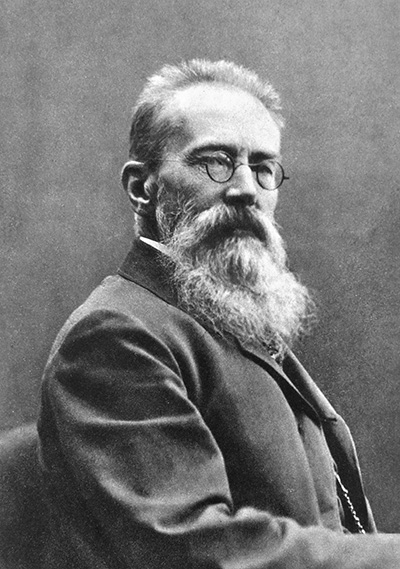Nikolai Rimsky-Korsakov

Born: March 18, 1844 in Tikhvin, near Novgorod, Russa
Died: June 21, 1908 in St. Petersburg, Russia
“Lithuanian Dance” and “Procession of the Nobles” from Mlada
- Composed: 1872
- Premiere: November 1, 1892 at the Imperial Theater in St. Petersburg, conducted by Eduard Napravnik
- Duration: approx. 8 minutes
In 1869, Alexander Dargomyzhsky died, leaving unfinished his opera based on the Don Juan legend, The Stone Guest. Nikolai Rimsky-Korsakov undertook the completion and orchestration of the work, and supervised its premiere at the Imperial Theater in St. Petersburg three years later. Rimsky was much imbued with the fervor of Russian nationalism at that time, and he suggested to the Theater’s director, S.A. Gedeonov, that the house should mount a spectacular opera-ballet titled Mlada to which he, Borodin, Mussorgsky and Cui would jointly contribute the music. Gedeonov agreed to the scheme, and a large amount of music was composed before the project had to be abandoned for budgetary reasons. Though the composers reused much of their music in other works, Mlada in its original concept remained an incomplete torso.
On February 27, 1889, Rimsky-Korsakov, Glazunov, Liadov and other musicians met to observe the second anniversary of Alexander Borodin’s death. They reminisced about their late friend, and played through several of his manuscripts, including his extensive sketches for the fourth act of Mlada. “In the middle of our conversations and our reminiscences of Borodin,” Rimsky-Korsakov recalled in his autobiography, “Liadov all of a sudden remarked that Mlada would make a suitable opera subject for me. Without hesitation, I said, ‘Very well, I’ll get on with it at once.’” Rimsky completely rewrote the libretto, resurrected his own sketches for the second and third acts, and composed anew the rest of the music, incorporating such recent Wagnerian operatic advances as an enlarged orchestra and a system of leitmotifs. Mlada was premiered in St. Petersburg on November 1, 1892 with considerable success, but it soon faded from the repertory. The opera, set in the 10th-century Slavic realm of Retra, near the Baltic Sea, plays out the conflict between the forces of good and those of the underworld in a series of representations of supernatural events for which Rimsky’s colorful music is the perfect complement.
The atmospheric Lithuanian Dance accompany a balletic entertainment during a midsummer festival in Act II. The brilliant Procession of the Nobles occurs in Act II during the arrival of a delegation of Czech elders and warriors to participate in a ritual ceremony invoking aid from the ancient gods against the invading Germans.
—Dr. Richard E. Rodda